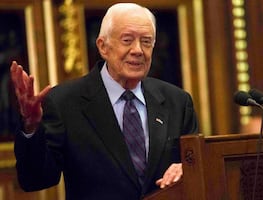Más Información

Sheinbaum cierra el 2024 con mensaje de Año Nuevo; recuerda legado de AMLO y reafirma continuidad de la 4T

Científicos de la UNAM desarrollan lombricompostaje; una alternativa eficiente para el manejo de heces caninas

Anuncian cierre de oficinas de EU en México por funeral del expresidente Jimmy Carter; citas serán reprogramadas
Mexico expects a finalized 12-nation Pacific trade deal to double the country's agricultural exports to Japan's mostly closed market, and the deal will likely be signed in the "next few weeks," a senior trade official said on Friday.
The so-called Trans-Pacific Partnership, or TPP, would potentially cover 40 percent of the world economy and raise annual global economic output by nearly US$300 billion.
Deputy Trade Minister Francisco de Rosenzweig said in an interview that Mexico's main aims in the final stretch of TPP negotiations are maintaining privileges with the United States, destination of about three-quarters of the country's exports, plus prying open new markets in Asia.
The TPP is the biggest trade deal since the North American Free Trade Agreement (NAFTA) liberalized commerce between the United States, Canada and Mexico two decades ago.
"Without a doubt, our priority is to strengthen our productive framework with the United States and preserve our preferential trade status that we have under NAFTA," de Rosenzweig said.
"Our second priority is to have a strong presence in Southeast Asia as well as access to the agricultural market in Japan."
De Rosenzweig said five years after the TPP takes effect, Mexican agricultural exports to Japan could double to about US$2 billion annually.
"We think one of the markets that is a winner in these negotiations is agriculture and livestock," he said.
Beyond new shipments of fruits and meat to the world's No. 3 economy, Mexican exports of personal hygiene products and other cosmetics to Japan could reach $5 billion, de Rosenzweig added. He did not give a time frame.
The minister touted a 2005 bilateral accord with Japan that made trade of industrial goods between the two nations easier. However, other markets remain largely closed.
While currency manipulation has emerged as a key concern for U.S. policymakers, de Rosenzweig downplayed the subject's prominence in the negotiations.
"To date, a written proposal has not been put on the table."
He said trade ministers from the dozen countries are discussing the exact timing and location for a final ministerial session, adding that the TPP could enter into force by the end of this year.
Earlier this week, the U.S. Senate passed crucial "fast-track" authority that will allow President Barack Obama to negotiate trade deals including TPP and speed their approval through Congress.







